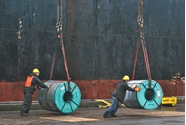Government/Policy

March 27, 2019
CAMMU: "Remove the Tariffs, Mr. President"
Written by Sandy Williams
March 23 marked the one-year anniversary of the Section 232 tariffs on steel and aluminum. The Coalition of American Metal Manufacturers and Users had the following comments for the Trump Administration:
“The Coalition of American Metal Manufacturers and Users urges the Trump Administration to terminate the Section 232 steel and aluminum tariffs. At their one-year anniversary, these tariffs continue to hurt steel-using manufacturers and consumers across the U.S. More and more manufacturers are reporting lost business to overseas competitors because of high steel prices in the U.S. and experiencing long delivery times for steel from their U.S. suppliers because the domestic steel industry cannot meet demand.
“In addition to the numerous reports that we are receiving from CAMMU member manufacturers about the negative impacts of the tariffs on their businesses, there is now considerable data showing the damage that tariffs are causing to the U.S. manufacturing sector and the broader U.S. economy:
- A study by the Peterson Institute for International Economics found that the 232 tariffs increased the price of steel products by 9 percent. However, steel users will pay an extra $650,000 for each job created, according to a recent study published by the organization.
- A study by CAMMU member North American Association of Food & Equipment Manufacturers (NAFEM) found that more than 80 percent of respondents reported the tariffs have negatively impacted their businesses, with more than half reporting that the steel and aluminum tariffs have impaired their ability to compete.
- A study by the Federal Reserve Bank of New York, Princeton University and Columbia University found that the Section 301 and 232 tariffs cost companies and consumers $3 billion a month in additional taxes and companies experienced a further $1.4 billion in deadweight losses. They also were causing the diversion of $165 billion a year in trade, leading to significant costs for companies having to reorganize supply chains.
- A study by economists from Columbia, UC Berkeley, UCLA, Yale, World Bank Group, and the National Bureau of Economic Research (NBER) found that U.S. consumers have paid the entire price for the Section 232 and 301 tariffs, and estimated an annual loss to the U.S. of $68.8 billion due to higher import prices.
“The domestic steel capacity utilization is now at 80 percent, according to the steel industry’s own trade association. This was the stated goal set by the Administration when it imposed the Section 232 steel and aluminum tariffs. It is time to terminate the tariffs outright with no quotas in their place so that U.S. steel and aluminum using manufacturers can compete with their overseas competitors.”







